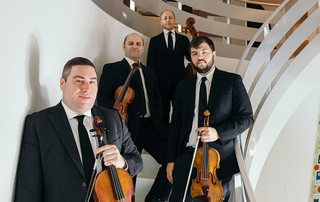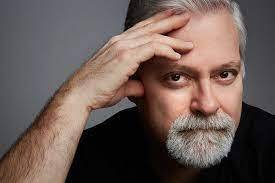|
Back
Alpha, Omega Etc. New York
BargeMusic
08/20/2021 - & August 21, 2021
Franz Schubert: String Quartet No. 10 in E-flat Major, D. 87
Daron Hagen: Snapshot #1
Antonín Dvorák: String Quartet No. 14 in A-flat Major, Opus 105
Amernet Quartet: Misha Vitenson, Avi Nagin (Violins), Michael Klotz (Viola), James Calloway (Cello)

Amernet String Quartet (© Courtesy of the artists)
“It sometimes seems as if I didn’t belong to this world at all.”
Franz Schubert
“I am just an ordinary Czech musician.”
Antonín Dvorák
The first and last items on last night’s BargeMusic program were fascinating because they were twice the alpha and omega! Schubert’s 10th Quartet was (despite the publication date) actually his very first string quartet, written when he was 15 years old. The Dvorȧk A-flat Major Quartet was his very last quartet, written when he was 54 years old. Add to that, the Schubert was written in 1813 as a coda to the Classical Era (Beethoven was composing his Seventh Symphony, but he as a musical outlier.) The Dvorȧk was written in 1894, the end of the 19th Century, a year before Hindemith was born.
And both works, as played by the Amernet String Quartet, were true to their origins, Schubert’s String Quartet was written by a Beethoven-worshiper, but this piece could have easily been composed by Haydn. The Dvorȧk, yes, had dance movement, was decidedly Czech, but in the developments and structure, evolved from a composer whose own voice was more complex, transcending mere gorgeous tune-making.
And now to the Amernet. The four virtuosi were well up their tasks. They were neither flashy nor idiosyncratic. Theirs were intelligent performances with mature players knowing their music.
Thus, they never tried to make Schubert more interesting than the notes. Nowhere (except in a few interesting displaced minor notes of the first theme) was it anything but an 18th Century exercise. Granted a perfectly composed exercise, played with deftness by the Amernet Quartet. They played the opening with temperate feelings, the second-movement scherzo (yes, Schubert changed the two middle movements), with a spiky delight.
Schubert was no teenaged Mendelssohn, and this quartet was no Midsummer Night’s Dream, so the Amernet needed no shimmer or extra zing. The exception was First Violinist Misha Vitenson, and this was due to the frequent solos. Where the rest of the Amernet preluded pure glossiness, Mr. Vitenson’s solos, while never saccharine, had a tonal sweetness, like an orchid growing amid a sward of emerald-green grass.
The Dvorȧk was more complicated, and the Amernet rarely took the chance of emphasizing the Slavic rhythms. The duple/triple rhythms of the Molto Vivace second movement hardly made one think of the dance. It was indeed a Furiant, it did have its surprising final chords. But this sounded more light, even equable, rather than energetic.
The slow movement did show the composer at his most soulful, his most lyrical. Jason Calloway’s cello sending almost minatory timpani-sounding taps against the songs of the other players.
Usually at the end of most Dvorák quartets, one feels a sense of joy, energy, a quasi-bucolic spiritedness. Here, one felt an appreciation for such so-warm playing.

D. Hagen (© Wintergreen-Music.com)
The short centerpiece of this hour-long concert came from the pen of American composer Daron Hagen. And with both humility and guilt, I confess that–despite his renown as a filmmaker, opera-and song-composer–the name was new to me. But so utterly unendingly beautiful was Snapshot #1 that I rushed back home to hear his other works.
I also wrote in my own notebook, “How is it possible for 16 gut-strings to create sound of nostalgia?” Mr. Hagen’s piece is based upon his mother’s writing. Not so much the message as the handwriting, which brings forth memories.
The music is mainly tonal. If I had to, I could compare it to some of Samuel Barber, or even Roy Harris. But Mr. Donen’s voice is incontestably his own. And the Amernet–which often specializes in contemporary works–played it with the commitment it deserved.
Harry Rolnick
|